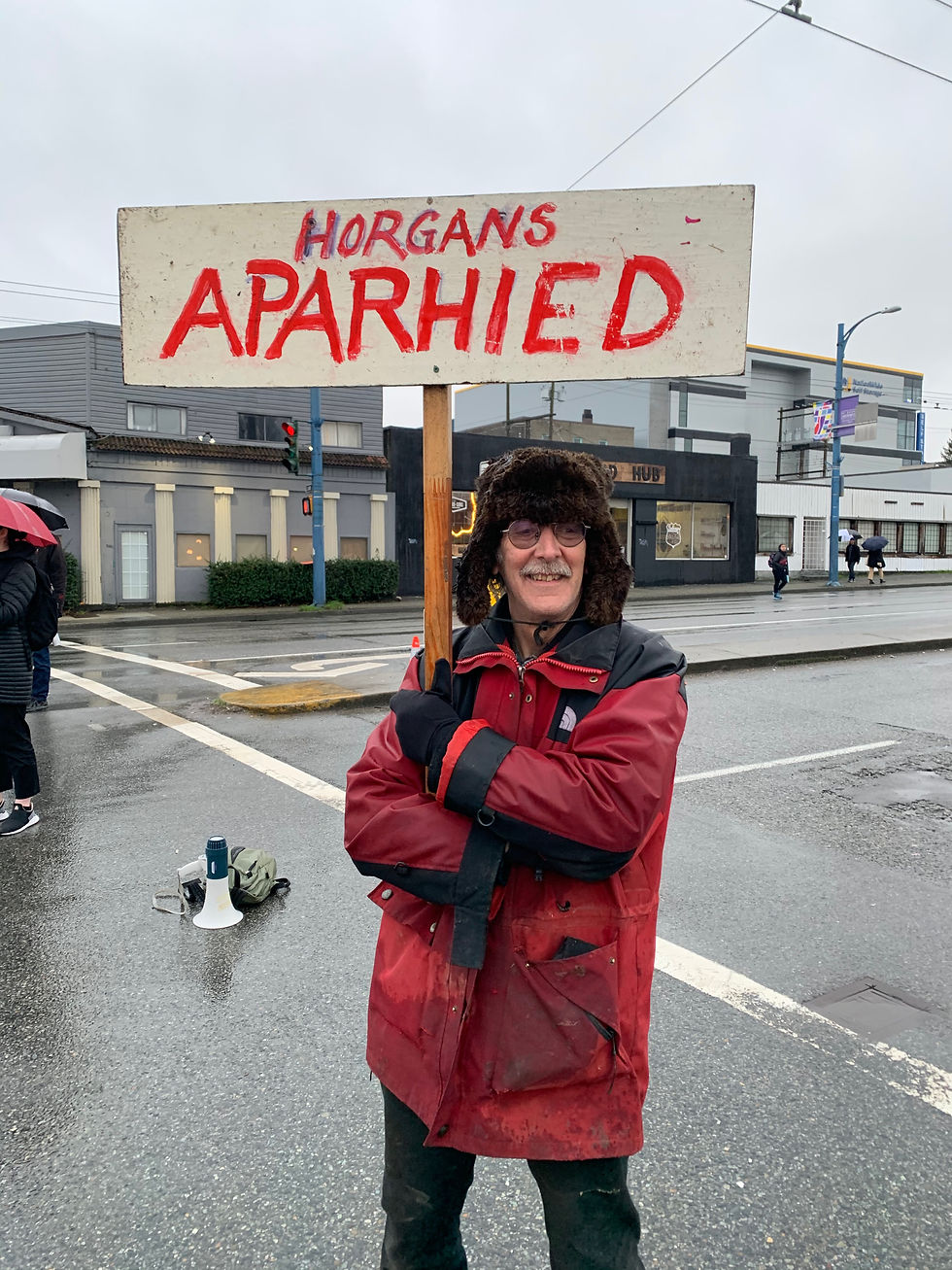Wet’suwet’en protesters show their solidarity in downtown Vancouver march
- jaynewright55
- Feb 6, 2020
- 4 min read

Jayne Wright
Date: January 30, 2020
With tension rising between the standoff of Wet’suwet’en people and Coastal GasLink, protests are taking place across the country
“I’m sorry we’re here. I’m sorry we have to gather like this… it’s with these broken pieces of my heart that I move forward because I don’t know what else to do … all I know is to get up and fucking go. I say rise, I say rise, I SAY RISE,” said Audrey Siegal activist, artist and member of the Musqueam nation.
Siegal spoke at the protest in downtown Vancouver in support of the Wet’suwet’en nation’s fight against Coastal GasLink on January 11, 2020. She wore her traditional regalia including woven cedar headband. The crowd was filled with hundreds of allies of the Wet’suwet’en, who listened intently as Siegal delivered her speech.
The sun was shining, but a brisk breeze blustered between city buildings as protesters stood with signs reading “Enough stealing from the next generation,” “No more pipelines! Solidarity with Wet’suwet’en Nation.” The sound of drums could be heard as protesters began their march through the streets.
Coastal GasLink (CGL) is pushing to take the next steps to build a pipeline that would run through and disturb the natural environment of traditional Wet’suwet’en territory.
“No matter where you stand on this planet … we’re coming together now, we’re standing … It shouldn’t be on one person’s shoulders, and right now all the weight has landed on the Wet’suwet’en people…,” said Siegal.
The protests occurring across Canada mainly address the court’s recent decision that grants the Royal Canadian Mounted Police (RCMP) permission to remove people obstructing access to the work site in Wet’suwet’en territory. The elected Wet’suwet’en council approved the project, but hereditary Chiefs refute this decision.
“Several oil and gas pipelines are currently proposed for Wet'suwet'en Territory. The Wet'suwet'en Hereditary Chiefs continue to review the impacts of these proposed projects in light of Wet'suwet'en title and rights,” reads the Wet’suwet’en website.
The Wet’suwet’en people have stopped Coastal GasLink from entering their traditional territories to build a pipeline that would run from Northeastern B.C. to Kitimat. Countless efforts have been put in place by the Wet’suwet’en people and their allies to prevent the pipeline project being initiated by Trans Canada. Exposure and concern spread across Canada when the short film Invasion, about the Unist’ot’en Camp, Gidimt’en checkpoint and the greater Wet’suwet’en nation, was released in November 2019.
“We need to put pressure on every single front. We need pressure with our dollars, we need pressure with our words, we need pressure with our bodies, we need pressure with our ceremonies,” Siegal said at the protest.
Siegal signaled the march to begin. People walked through the downtown streets of Vancouver chanting as drums beat.
Protester Alicia Sereni stands with the Wet’suwet’en nation.
“[Marching] is a way of showing support with my body for Indigenous sovereignty over their own territories. Just wanting to be present and opposing the RCMP imposing on the Wet’suwet’en territory, and just acknowledging that the police in Canada were literally formed to forcibly remove Indigenous people from their lands. So, [I] want… to stand in opposition to that,” says Sereni.
Sereni trailed through the downtown streets with friends amongst the noisy protesters. She was grateful it was just cold and not raining, though she didn’t think it would have stopped the passionate supporters from showing up, she said.
“I hope that the folks in Wet’suwet’en territories are feeling supported and [know] that they have people standing in solidarity with them around the world. It’s really important to be visible support of them [in the city] so they can continue to do their work in their homelands,” says Sereni.
After the march, speeches continued in Victory Square. World-renowned environmentalist David Suzuki spoke in support of the Wet’suwet’en people, stressing the environmental impacts of pipelines. Suzuki acknowledged the dedicated work that Indigenous people do for the environment.
“All I’ve learned as an environmentalist has been taught to me by Indigenous people.” Suzuki said.
Melinda Kachina Bige is Cree and Dene from the Lutsel Ke’Dene community in the Northwest Territories. Bige is an Indigenous Studies Instructor at Kwantlen Polytechnic University. She and her husband, Brandon Gabriel, who is a member of the Kwantlen First Nations, have spent time in Wet’suwet’en territory.
“When Indigenous people say ‘no,’ we don’t want industry, they bring in a specialty tactical team, and basically, they threaten to murder everybody… they create slander,” says Bige.
Bige says she has a huge amount of appreciation for the Wet’suwet’en people and their work.
“[The Wet’suwet’en people] really lead the way for a lot of Indigenous people … modelling what active decolonization looks like,” says Bige.
Bige said there is little to no acknowledgement of the biggest issue at hand with the Wet’suwet’en controversy - white supremacy. In regard to the 20 nations that have signed with CGL, Bige says it was elected officials, under colonial law, who gave the pipeline the green light. Those elected officials were not trained under traditional Indigenous practice to be the leaders of their communities as the hereditary Chiefs have been. Bige says it’s easier to portray the conflict and Indigenous person against Indigenous person issue, further reinforcing the influence of white supremacy.
“The Wet’suwet’en have actively been representing themselves with their own media on the ground. That is the story we need to be following… [the Wet’suwet’en] are doing an incredible service to all of us that we don’t deserve, because we should be out there doing this work [too],” says Bige.
To learn more about the Wet’suwet’en nation visit https://unistoten.camp/about/wetsuweten-people/.







Comments